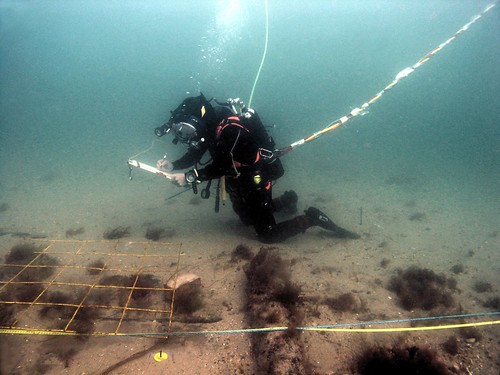An incredible ancient settlement off Britain‘s south coast that could ‘rewrite the history books’ is in danger of being swept away, unless archaeologists secure enough funding to launch full-scale excavations by next year. Experts have been astounded by the discovery of 24 worked timber fragments found on underwater diving expeditions to an underwater cliff of Bouldner, on the north coast of the Isle of Wight. Hundreds of objects such as flint, charcoal, hazelnuts, string and the remains of a longboat have been found alongside the fragments, which many feel are the remnants of a huge structure built over 8,000 years ago.
Garry Momber, director of the Hampshire and Wight Trust for Maritime Archaeology (HWTMA), tells local news the 24 timber pieces, found two months ago, are the area’s most staggering find to date:
“We were in shock. This is more comprehensive than anything I thought we would ever find and I’m sure there is an awful lot more to be uncovered.” Mr Momber claims the discoveries proove prehistoric people inhabited the banks of the Solent – the strait which divides mainland UK with the Isle of Wight. “Each piece of timber has very clear and distinct cut marks, so we know they have been worked on,” he adds. “Its an elaborate framework and the timber appears to be linked. It could be a collapsed structure, or perhaps a platform built close to the waterway. This really pushes forward our understanding of the area,” claims Mr Momber, “because it shows they were well established and capable of craftsmanship.”
Bouldner’s cliff has held onto its millennia-old treasures thanks to an absence of oxygen-related erosion, meaning many more could be found in its murky depths thanks to underwater archaeology. Yet the three-day dive which produced the timbers cost a cool 3,600 – and Mr Momber is fearful that sweeping tides could wash away the ancient settlement for good unless action is taken in the next year. “This really is of national and international significance – there is nothing else like it in the UK,” he says. “The race is on to save what we can now. If we dont act now, these findings could be lost forever.” The Solent isn’t the only area in Britain to have enjoyed a recent timber windfall – London’s earliest timber structure was found only two months ago in bogs beside a high-security prison.




